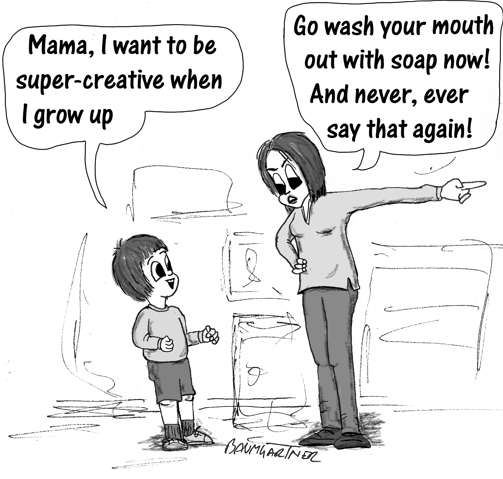
Mammas Don't Let Your Babies Grow Up To Be Creatives
By Jeffrey Baumgartner
If you are planning a family, you might be keen on having creative children. Very likely you have read that businesses of tomorrow will need creative thinkers to steer them through the unpredictable waters of technological change. With a little encouragement, your child could grow up to be a creative business leader like Steve Jobs or Elizabeth Holmes. Perhaps she will be a famous, creative author like JK Rowling or the next Picasso.
With a world that embraces creative children, it is perfectly understandable if want a super creative child who would virtually be guaranteed a well paying job, unless she preferred to be a successful entrepreneur, artist, composer or author.
The thing is, the world does not actually embrace creative children − or adults for that matter. In truth, people do not like creative thinkers or their ideas. Only a tiny number highly creative people are super-successful. Many struggle because of their creative minds.
Business Leaders Lie About Creativity
Business leaders claim they want to hire creative people, but most of them hire people who are just like existing employees and who are unlikely to rock the corporate boat with truly original ideas. Most artists fit the cliché of being a poor starving artists and most authors effectively earn an hourly wage somewhat less than a trainee at McDonalds. Unless your child has the right skills on top of her creativity, such as sales and marketing, she is unlikely to be a wildly successful entrepreneur. If she has no ability to express her creativity, she may be frustrated and disappointed.
I know creative people who are successful in arts, business and literature. But I also know highly creative people working dismal government jobs because such jobs are safe. Their creativity is expressed through in their humour and their hobbies but is restrained during working hours. They know from long experience that creative ideas in government are about as welcome as a family of skunks in the staff canteen.
Creative people in businesses often fare worse. If they express their creativity, such as by questioning processes and suggesting new ways to change those process, they are branded as rebels. They are the odd men and women who never quite fit into their teams. Unless they have particularly strong skills beyond their creativity, they are likely to be overlooked, come promotion time, in favour of their more conforming colleagues.
This is not a recipe for professional happiness.
Some Exceptions
Sure, there are exceptions. If your child also has the technical skills of an artist, she might become a graphic designer. If he is a natural born salesman, he might well become a successful entrepreneur. If she can write, she might go into advertising copywriting, which pays far better than journalism or fiction. He or she could well become famous. A few creative people do.
She might even write a best selling novel, a hit song or sell her paintings for tens of thousands of dollars.
But, these people are the exceptions. Many more creative people struggle to get on in business, the arts or even government. The most successful often succeed because they use their creative ability to adapt to the culture of their organisations rather than because they contribute their creativity to organisations.
Much of What You Have Heard About Creativity Is A Lie
The truth is, much of what you have heard about creativity is a lie. Businesses do not want highly creative thinkers disrupting their ways. Government despises change and the arts is a hard place to earn a living. Even teachers are known to like least their most creative pupils.
Moreover, people do not even like creative ideas. They usually hate them. They prefer the status quo. They don't like change and they like the uncertainty around change even less. Creative ideas disrupt that certainty, go against the status quo and threaten change.
It gets worse, not only is your child unlikely to fit into business, the arts or science, but she is unlikely to fit in socially either. As a non-conformist rebel who questions that status quo, she will almost certainly find herself at the edge of several social groups, but not entirely connected to or even welcome in any of them. If she's lucky, her creativity will inspire a sense of humour which will ensure she is liked − as long as she does not expect to be embraced by the group.
So, by all means, raise a child to be a little bit creative. But do not hope or pray for a highly creative child. To misquote the famous country and western song by Ed and Patsy Bruce: "Mammas don't let your babies grow up to be creative."
Further Reading
The Bias Against Creativity: Why People Desire But Reject Creative Ideas by Jennifer S. Mueller, Shimul Melwani and Jack A. Goncalo
Why No One Really Wants Creativity by Barry Straw
Why We Don’t Like Creativity by Randy Reiland




